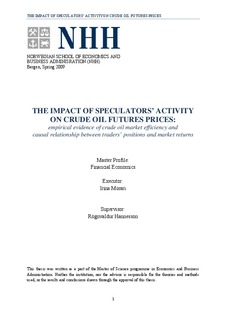| dc.description.abstract | Recently the speculators activity in crude oil futures markets has received a great deal of scrutiny – for instance, OPEC argued that speculators have been a critical factor to push up oil prices.
The objective of this paper is to assess the claims regarding speculative influences on oil price. More specifically, I intend to investigate whether speculation/arbitrage opportunities exist in crude oil futures market by testing for market efficiency; and, whether speculators do affect crude oil futures prices by testing for causality between traders’ futures positions and market returns.
For this purpose I apply Johansen’s co-integration methodology (1988), Engle-Granger’s error-correction methodology (1987), Granger causality framework (1969) and Cumby and Modest’s market timing framework (1987).
For the first test, findings show that the oil futures market is “long-term” efficient but does undergo “short-term” deviations; and that futures prices lead spot prices; furthermore, it was confirmed that futures prices on contract of longer maturity lead futures contracts with shorter maturity.
For the second test, it was found that traders’ positions do not generally lead market returns; and that extreme levels of traders’ positions have no impact on market returns.
These results have implications for various players in the oil market like international organizations, oil companies and governments when making investments decisions and policy recommendations. | en |
